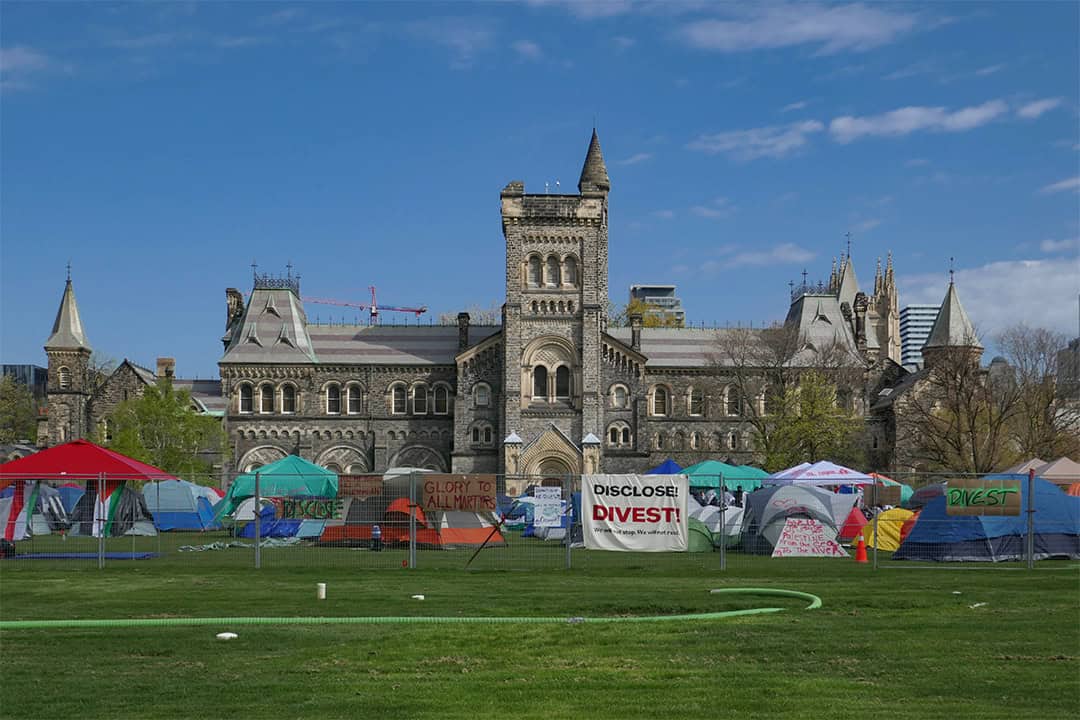Around 200 protesters and 75 camps remain set up within the gated fence of King’s College Circle. On May 4, students entered the third day of calling on U of T to divest funding from companies that supply the Israeli military.
Students within the encampment have expressed safety concerns as they remain unsure of the university’s response.
Both faculty members and unions have continued to demonstrate their support for the students’ encampment and solidarity with Palestine.
“Safety concerns”
Spokesperson Erin Mackey from UofT Occupy for Palestine (O4P) — the group of students organizing the protest — told The Varsity that she, and other student protesters, were receiving threats to their safety by members of the public.
However, Mackey — a fifth-year student studying environmental justice and political science — noted she felt “more unsafe by the administration who continues to dangle the threat of police escalation over [students’] heads because we know that the police is violent.”
She referenced precedents in the US, where hundreds of student protesters were arrested for setting up encampments at their universities. Despite this, Mackey recognized that the support they’ve received from U of T faculty, staff, and community members has been “amazing.”
“Just to see the fact that they’re willing to put their job on the line to stand in solidarity with their students, to stand in solidarity with Palestine, it really says so much more about them than this institution,” she said.
Mackey claimed that the university had shut down access to all washrooms on campus. She also spoke about the large lights set up around the field since the first night students set up camp on the field. Mackey claimed that the lights are controlled by the administration and turned on throughout the night.
In a message to the university community, Sandy Welsh, Vice-Provost, Students and Kelly Hannah-Moffat, Vice President, People Strategy, Equity and Culture noted that effective at 5pm on May 3, most university buildings were locked and required fob-access, “as per normal practice.” They added that Gerstein Library and Robarts Library remain open to “members of the U of T community.”
For Mackey, the university is “choosing every other option instead of what we’re actually demanding,” as she cited U of T’s decision to divest from South African apartheid in 1988 and divest from fossil fuel investments in 2021.
Mackey and other protesters within the encampment also alleged that around 8:00 am, the university administration had sent construction workers and Campus Safety officers to remove portions of the fence surrounding the encampment due to “safety concerns.”

KAISA KASEKAMP/THEVARSITY
She noted that it was “odd” that the university would create entry points while the protesters’ received increasing threats to their safety.
When asked about the missing portions of the fence, the university did not comment.
Support for students’ fundamental right to protest
Deb Cowen — a professor at the Department of Geography and Planning as well as a member of the Canadian Jewish faculty group, Jewish Faculty Network — explained that they wanted to be at the encampment “as a presence and [to] be visible for the students.”
“We want to make sure that we’re saying to the city, to the administration, and to the wider world, faculty support our students and faculty support the fundamental right of students to be here doing what they’re doing,” they said.
Cowen referred to the university’s Statement of Institutional Purpose, which states that U of T is “dedicated to fostering an academic community in which the learning and scholarship of every member may flourish, with vigilant protection for individual human rights.”
They explained that the Statement of Institutional Purpose is “absolutely wed to the rights [of] academic freedom, freedom of assembly, and freedom of speech.” Cowen added, “I feel like I’m here defending our institution against a particular administration that is maybe not honouring it enough.”
According to Cowen, dozens of faculty members had been at the encampment during the day to watch and support the protesters. “This little village that’s emerging is a model of what we should become,” they noted. “This is a beautiful, peaceful and inspiring camp, and the students deserve respect.”
Sheila Mattar, another community member supporting the encampment, came to show her support for students. “I didn’t want to be covered up, I’m not scared of the media or anyone because I have every right to be here,” she said.
Mattar called on the university to learn about Palestinian history and to “stop supporting arms that are killing innocent children and people in Palestine.”
Since October 7, attacks on Israel by the militant group Hamas have killed approximately 1200 people in Israel, while strikes on Gaza by the Israeli military have killed nearly 35,000 Palestinians.
May Day Rally
At around 5:00 pm, approximately 100 people gathered in front of the encampment’s entrance as part of the May Day Rally — an annual demonstration that marks International Workers Day.
Organized by the Ontario Federation of Labour (OFL) — Canada’s largest labour federation representing 54 unions in the province — the rally aimed to advocate for affordable housing, well-funded public services, and liveable wages.
Mackey noted that while the OFL had been planning the rally for months, when the Federation found out that the encampment was happening, they rerouted their demonstration to stand in solidarity with the student protesters.
With files from Kaisa Kasekamp and Maeve Ellis.
Editor’s note (May 5): This article has been updated to reflect that Sandy Welsh and Kelly Hannah-Moffat sent a message that most university building were locked as of 5 PM on May 3, not a U of T Spokesperson on May 4.


